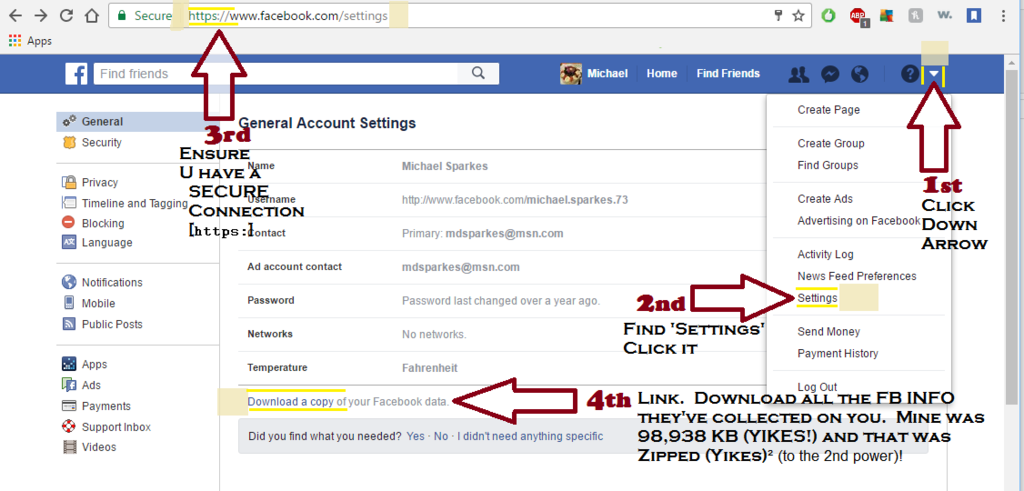Download all the information FB has on you. You'll be surprised! 
Here's how:

While in Facebook:
They will email a HYPERLINK to your FB email address of record. Follow their instruction(s).
It will be zipped. It will be HUGE.
Imagine - every single picture you're ever uploaded, each post, every friend, everybody you're ever unfriended, lots and lots moar. Tons of Data and why not? Data storage is cheap.
PS Per the Facebook ToS all 'your' data belongs to them.

Here's how:

While in Facebook:
1. Click [Upper_Right]-[Down_Arrow] for 'MENU'
2. Find and click 'SETTINGS'
3. Ensure you have a 'SECURE CONNECTION' --OR JUST--
CLICK --> [https://www.facebook.com/settings]
4. Then Click: "Download a copy of your Facebook data"
__________________________2. Find and click 'SETTINGS'
3. Ensure you have a 'SECURE CONNECTION' --OR JUST--
CLICK --> [https://www.facebook.com/settings]
4. Then Click: "Download a copy of your Facebook data"
They will email a HYPERLINK to your FB email address of record. Follow their instruction(s).
It will be zipped. It will be HUGE.
Imagine - every single picture you're ever uploaded, each post, every friend, everybody you're ever unfriended, lots and lots moar. Tons of Data and why not? Data storage is cheap.
Thought Bubble_1 says: ". o O (( We have to figure out what to do with all that storage right? ))"
Brilliant idea_2 replies: ". o O (( Oh! I know! Let's use it to track our "members". ))"
PS Per the Facebook ToS all 'your' data belongs to them.
By Oliver Smith said:Quoted From: 'Facebook terms and conditions: why you don't own your online life' by Oliver Smith, Published online Sunday 12 February 2017, by The Telegraph.co.uk
With over a billion users, Facebook is the definitive homepage for many web users. Its terms of service, data use and cookie use policy span more than 14,000 words over eight separate pages and would take even the quickest reader more than two hours to dig through. But what rights have you handed over to Facebook?
[read moar at: Facebook terms and conditions: why you don't own your online life ]
